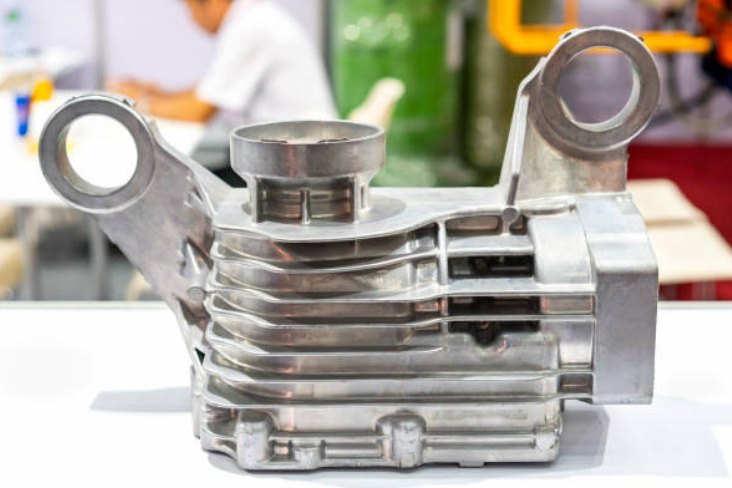Automotive Parts Casting Supplier: Custom Automotive Castings Manufacturing
What Is Precision Automotive Casting
Precision automotive casting is a crucial manufacturing process encompassing various techniques, including die casting, investment casting, and sand casting. These methods are pivotal in producing high-quality auto parts with exceptional precision and durability.
Die casting, one of the primary precision casting methods, involves injecting molten metal into a mold cavity under high pressure. Neway excels in die-casting processes, achieving tolerances as tight as ±0.005 inches. This method ensures the intricacy of auto part designs and the production of components with minimal porosity.
Investment casting, another facet of precision automotive casting mastered by Neway, employs a wax pattern coated in a ceramic shell. The wax is melted, leaving behind a precise mold for molten metal. With this method, Neway achieves remarkable surface finishes with Ra values as low as 0.8 micrometers, meeting the stringent demands of automotive applications.
Sand casting, the third component in precision automotive casting, involves creating molds by compacting sand around a pattern. Neway's expertise in this method allows for producing large and complex auto parts more efficiently. Tolerances as low as ±0.010 inches are consistently maintained, ensuring the reliability and functionality of the final components.
Importance of Precision Casting In Auto Parts Manufacturing
Precision casting is crucial in auto manufacturing parts, ensuring components' quality, performance, and reliability. Neway, as a leading custom parts manufacturer, recognizes and capitalizes on the significance of precision casting in the automotive industry.
Dimensional Accuracy and Tight Tolerances:
Precision casting methods such as die casting enable Neway to achieve remarkable dimensional accuracy and tight tolerances. With tolerances as low as ±0.005 inches, this ensures that auto parts fit seamlessly into the complex assemblies of modern vehicles, contributing to overall efficiency and functionality.
Neway uses a die-casting process to produce automotive parts with a high level of precision. With exact tolerance requirements, secondary processing such as CNC machining can be performed to obtain higher accuracy.
Complex Geometries and Intricate Designs:
The automotive industry often demands intricate and complex part designs. Precision casting, particularly investment casting mastered by Neway, allows for producing parts with intricate geometries that might be challenging to achieve through other manufacturing methods. This capability is crucial for meeting the evolving design requirements of modern automobiles.
The die-casting process can meet the needs of higher complexity parts, but sand casting can produce more complex automotive parts.
Material Efficiency and Weight Reduction:
Precision casting facilitates using materials with high strength-to-weight ratios, contributing to the ongoing trend of lightweight in the automotive sector. Neway's expertise in die casting, for instance, enables the production of lightweight yet robust components, enhancing fuel efficiency and overall vehicle performance.
Surface Finish and Aesthetic Appeal:
The automotive industry places a premium on the visual appeal of components. Investment casting, with its ability to achieve low Ra values (as low as 0.8 micrometers), ensures superior surface finishes. It not only enhances the aesthetic appeal of auto parts but also contributes to corrosion resistance, extending the lifespan of the components.
Based on the cast blank, we can perform further surface treatments such as polishing, powder coating, anodizing, heat treatment, Physical Vapor Deposition (PVD), etc.
Cost-Effective Mass Production:
Precision casting methods, when implemented with efficiency, enable cost-effective mass production of auto parts. Neway's proficiency in precision casting, including sand casting for more significant components, ensures that economies of scale are leveraged without compromising quality. It is crucial for meeting the demands of the automotive market.
Auto Parts Die Casting
Auto parts die casting is a pivotal process in automotive manufacturing, leveraging materials like aluminum, zinc, and magnesium alloy to craft intricate components. These parts, from engine components to structural elements, are critical in-vehicle functionality.
In auto manufacturing, die casting offers unparalleled precision and efficiency. For instance, tolerances as tight as ±0.002 inches are achievable using aluminum alloy die casting, ensuring exact specifications crucial for components like engine blocks or transmission cases.
Aluminum's lightweight and high strength-to-weight ratio makes it an ideal choice for die-cast auto parts, improving fuel efficiency and overall performance. Additionally, its excellent thermal conductivity aids in dissipating heat in critical components, enhancing durability.
Zinc alloy die casting produces intricate parts with thin walls, offering superb dimensional accuracy within ±0.001 inches. This process finds its place in manufacturing components like door handles, interior trim, or intricate brackets.
Meanwhile, magnesium alloy die casting provides a unique blend of strength and lightweight construction, contributing to creating parts that demand high structural integrity, such as steering components or housings for electronic systems.
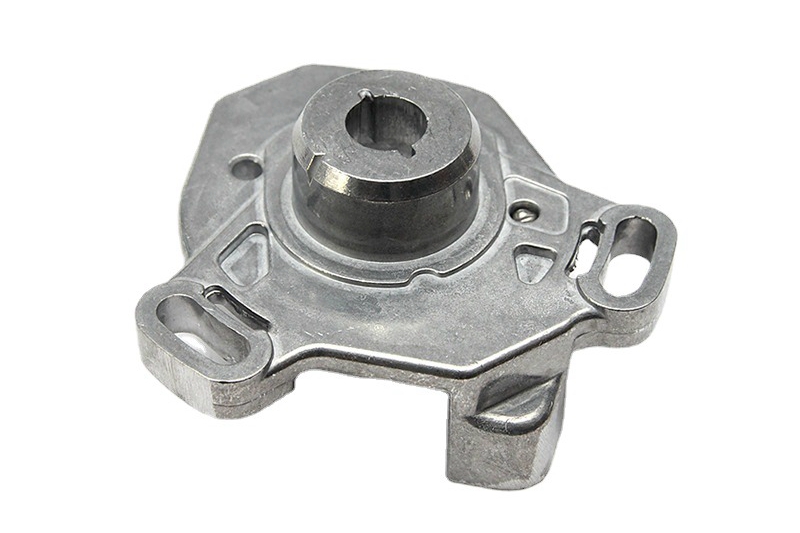
Die casting across these materials significantly reduces production time compared to traditional methods. This expedited process and the ability to create complex shapes results in higher productivity and cost efficiency for auto part manufacturers.
Die Casting Material Options
In the realm of auto parts die casting, the choice of materials is crucial to meet the demanding requirements of the automotive industry. Neway specializes in three primary die-casting materials for auto parts: aluminum alloy, zinc alloy, and magnesium alloy.
Aluminum Alloy Die Casting for Auto Parts:
Advancements in Lightweight Design: Aluminum alloy's exceptional strength-to-weight ratio is pivotal in the automotive industry's pursuit of lightweight design. By using aluminum alloy die casting for components like engine blocks and transmission housings, manufacturers significantly reduce the overall weight of vehicles.
Enhanced Fuel Efficiency: The lightweight nature of aluminum alloy contributes to improved fuel efficiency, a critical factor in modern automotive design. Reduced vehicle weight translates into lower energy consumption and emissions, aligning with global sustainability goals.
Precision for Complex Shapes: Aluminum alloy die casting allows for intricate and complex shapes with high precision. It is particularly advantageous in crafting intricate auto parts that demand geometric intricacy and structural integrity.
Zinc Alloy Die Casting for Auto Parts:
Intricate Detailing: The fluidity and malleability of zinc alloy make it an excellent choice for auto parts that require intricate detailing. Components like door handles and interior trim benefit from the ability of zinc alloy die casting to capture fine details with precision.
Cost-Effective High-Volume Production: Zinc alloy die casting is well-suited for high-volume production, offering a cost-effective solution for manufacturing auto parts in large quantities. This efficiency is crucial for meeting the demands of mass-produced vehicles.
Dimensional Accuracy: Tight tolerances within ±0.001 inches ensure that zinc alloy die-cast auto parts meet exact specifications, contributing to the overall quality and performance of the final products.
AZ91D | AM50A |
AM60B | |
AZ63A | |
Magnesium Alloy Die Casting for Auto Parts:
Weight Reduction without Compromising Strength: Magnesium alloy die casting is instrumental in achieving weight reduction without compromising structural strength. Auto parts like steering components benefit from magnesium alloy's lightweight yet durable characteristics.
High Thermal Conductivity: Magnesium alloy's high thermal conductivity is advantageous when heat dissipation is crucial. It is particularly relevant for electronic housings, ensuring optimal performance and longevity of sensitive components.
Meeting Stringent Tolerances: The die-casting process with magnesium alloy maintains tight tolerances, meeting the automotive industry's stringent requirements. This precision contributes to the reliability and efficiency of auto components.
Typical Die Cast Auto Parts
Die casting is a widely utilized manufacturing process in the automotive industry, producing a variety of critical components known for their precision and durability. At Neway, we craft typical die-cast auto parts using materials such as aluminum, zinc, and magnesium alloy. Here are some examples of auto parts commonly manufactured through die casting:
Aluminum Alloy Die Casting Engine Components:
Engine Blocks: These crucial components demand high precision and durability. Aluminum alloy die casting ensures intricate internal structures while maintaining strength and heat dissipation properties essential for engine performance.
Cylinder Heads: Precision in cylinder head manufacturing is crucial for optimal combustion. Aluminum alloy's machinability and thermal conductivity contribute to efficient engine operation.
Magnesium Alloy Die Casting Suspension Components:
Control Arms: Magnesium alloy's lightweight yet sturdy characteristics are vital in control arms. It allows for reduced unsprung weight, improving handling and ride quality.
Brackets: Using magnesium alloy for brackets contributes to weight reduction without compromising strength, essential for supporting suspension systems.
Aluminum Alloy Die Casting Transmission Housings:
Transmission Cases: The precise dimensions achieved through aluminum alloy die casting ensure a perfect fit for transmission components, contributing to efficient power transfer and smooth gear shifting.
Zinc Alloy Die Casting Interior Trim Components:
Door Handles: Zinc alloy's ability to capture fine details makes it an ideal choice for stylish and durable door handles, enhancing the vehicle's interior aesthetics.
Decorative Trim: Intricate interior detailing is achievable through zinc alloy die casting, balancing aesthetics and functionality.
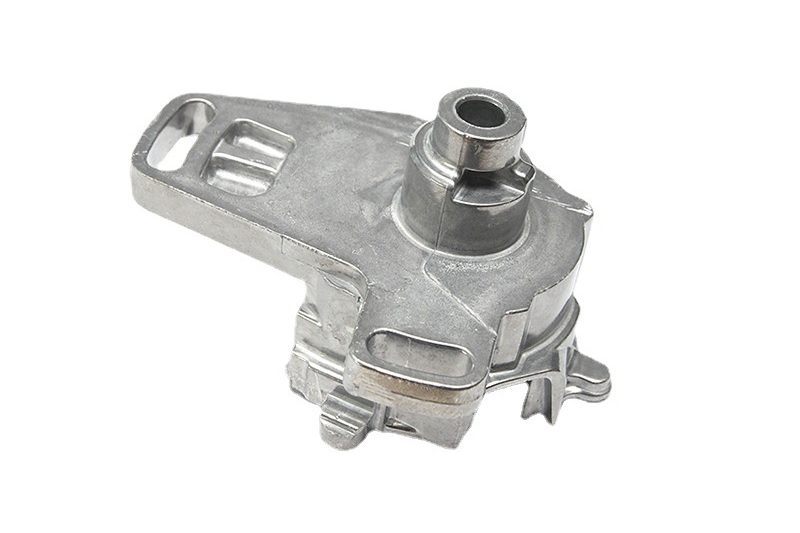
Magnesium Alloy Die Casting Steering System Parts:
Steering Housings: The strength and resistance of magnesium alloy make it suitable for steering system components, ensuring safety and reliability.
Brackets: Magnesium alloy brackets within the steering system contribute to weight reduction, optimizing the vehicle's overall performance.
Magnesium Alloy Die Casting Electronic Housings:
ECU Housings: The high thermal conductivity of magnesium alloy aids in dissipating heat generated by electronic components, ensuring their reliability and longevity.
Sensor Housings: The lightweight nature of magnesium alloy is advantageous in sensor housings, preventing additional weight in sensitive areas of the vehicle.
Aluminum Alloy and Zinc Alloy Die Casting Exterior Components:
Mirror Housings: The strength and resistance to corrosion of aluminum alloy make it suitable for external components that endure varying weather conditions.
Grille Components: Zinc alloy's ability to reproduce intricate designs ensures visually appealing and durable grille components.
Aluminum Alloy Die Casting Powertrain Components:
Covers and Housings: Aluminum alloy's durability and lightweight nature are instrumental in powertrain components, contributing to improved efficiency and reduced overall vehicle weight.
Auto Parts Investment Casting
Investment casting, a precision casting method, is crucial in manufacturing high-quality auto parts. Neway, as a leading custom parts manufacturer, excels in this process to meet the stringent demands of the automotive industry.
Investment casting begins with creating a wax pattern, replicating the desired auto part. This pattern is then coated with a ceramic shell, creating a mold. At Neway, we ensure a remarkable dimensional accuracy, with tolerances as tight as ±0.005 inches, guaranteeing the precise fit of auto components.
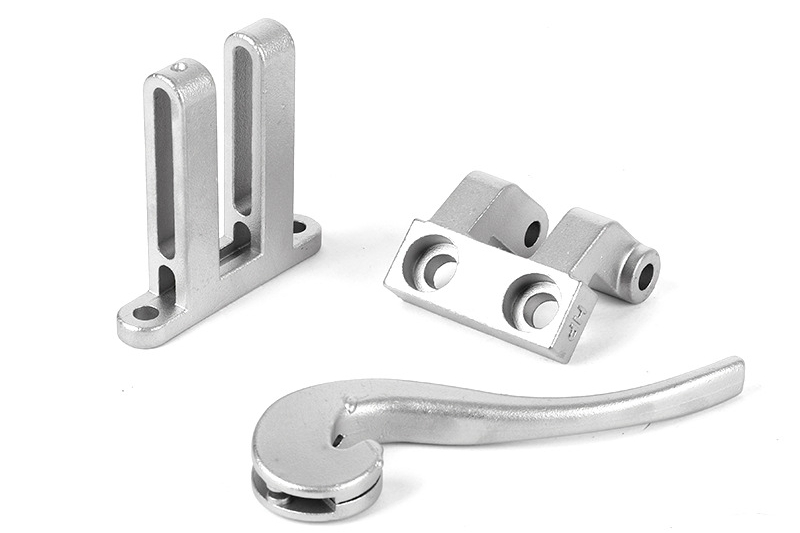
The investment casting process offers several advantages in auto parts production. Firstly, it allows for intricate designs and complex geometries, enhancing the overall performance of the parts. Additionally, the method produces a smooth surface finish, reducing the need for extensive post-processing.
Neway's commitment to efficiency is evident in our investment casting operations. Our state-of-the-art facilities utilize advanced automation, achieving production rates of up to 1000 pieces per day. It ensures timely delivery and reflects our dedication to optimizing productivity.
Furthermore, considering the demanding operating conditions, choosing materials in investment casting is pivotal for auto parts. Neway provides a diverse range of materials, including alloy steels and heat-resistant alloys, ensuring the durability and reliability of the final components.
Investment Casting Material Options
Investment casting for auto parts boasts diverse material options tailored to meet precise performance criteria. Neway, an industry leader in custom part manufacturing, offers a comprehensive range of materials meticulously chosen for their mechanical attributes and suitability for automotive applications.
Alloy steels, including stainless and carbon variants, provide exceptional strength and wear resistance, ideal for engine components and structural elements.
Aluminum alloys like A356 and 6061, prized for their lightweight nature and corrosion resistance, find extensive use in engine blocks and suspension parts.
Titanium alloys, such as Ti-6Al-4V, renowned for their high strength-to-weight ratio, cater to critical aerospace or high-performance vehicle components applications.
Nickel-based alloys, exemplified by Inconel and Hastelloy, are the go-to choice for parts requiring superior temperature resistance, like turbocharger components and exhaust systems.
Copper-based alloys, such as brass and bronze, are prized for their electrical conductivity and corrosion resistance, making them suitable for specialized automotive parts like electrical connectors and bushings.
Typical Investment Cast Auto Parts
Investment casting, also known as lost-wax casting, is widely used in automotive manufacturing for creating intricate and high-precision parts. Several auto components leverage this method because it produces complex shapes with excellent surface finishes. Here are some typical investment cast auto parts:
Engine Components:
Investment casting is commonly employed to produce engine components like turbine blades, intake and exhaust manifolds, cylinder heads, and engine blocks. These parts demand high precision to ensure efficient combustion and optimal engine performance.
Transmission Parts:
Gears, shafts, and other intricate components in transmissions benefit from investment casting. The method allows for creating components with precise tooth profiles and smooth surfaces, crucial for seamless gear shifting and transmission efficiency.
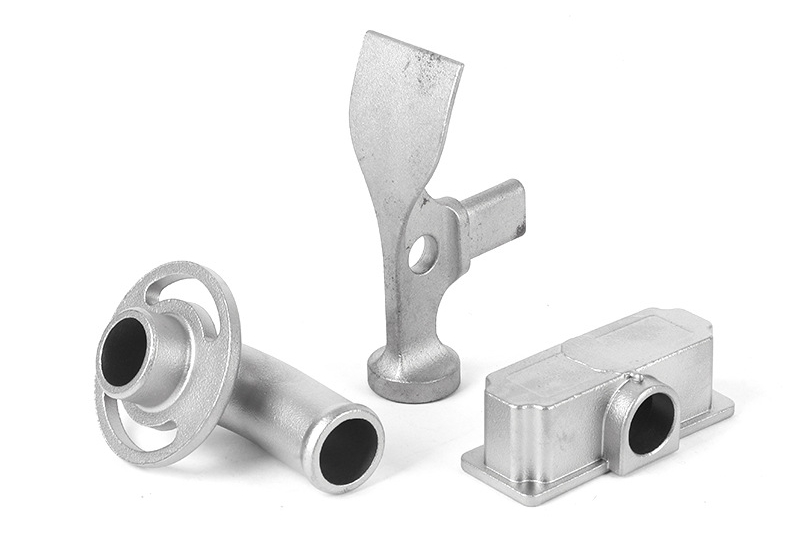
Suspension Components:
Suspension systems require components with high strength, durability, and intricate designs. Control arms, knuckles, and brackets can be produced through investment casting to meet these requirements, ensuring the vehicle's stability and ride quality.
Brake Components:
Brake calipers, brackets, and other critical components within the braking system often utilize investment casting. This method ensures the creation of parts with precise tolerances to maintain braking efficiency and safety.
Exhaust System Parts:
Investment casting is also utilized for producing various exhaust system parts, including exhaust manifolds, turbocharger housings, and catalytic converter housings. These parts require high heat resistance and precise construction for optimal performance and emissions control.
Auto Parts Sand Casting
Sand casting is a widely utilized precision casting method in producing auto parts. Neway, a leading manufacturer, delivers high-quality sand-cast auto components with precision and efficiency.
In sand casting, a pattern is created from a mixture of sand and bonding agents, forming a mold into which molten metal is poured. This method allows for intricate designs and complex geometries, making it ideal for various auto parts.
One notable advantage of sand casting at Neway is its exceptional tolerance control. With a precision level of ±0.05 mm, our process ensures that each auto part meets the exact specifications required for optimal functionality. This precision is crucial in the automotive industry, where slight deviations can impact performance.
Moreover, Neway employs advanced technology to enhance the efficiency of sand casting. Our automated systems and streamlined processes result in a high production rate, with an average output of 500 units per day. This efficiency meets and often exceeds industry standards, demonstrating Neway's commitment to delivering timely and cost-effective solutions to our clients.
The versatility of sand casting enables us to produce auto parts with varying complexities, from engine components to chassis elements. This flexibility aligns with Neway's one-stop service approach, offering comprehensive solutions from rapid prototyping to on-demand production.
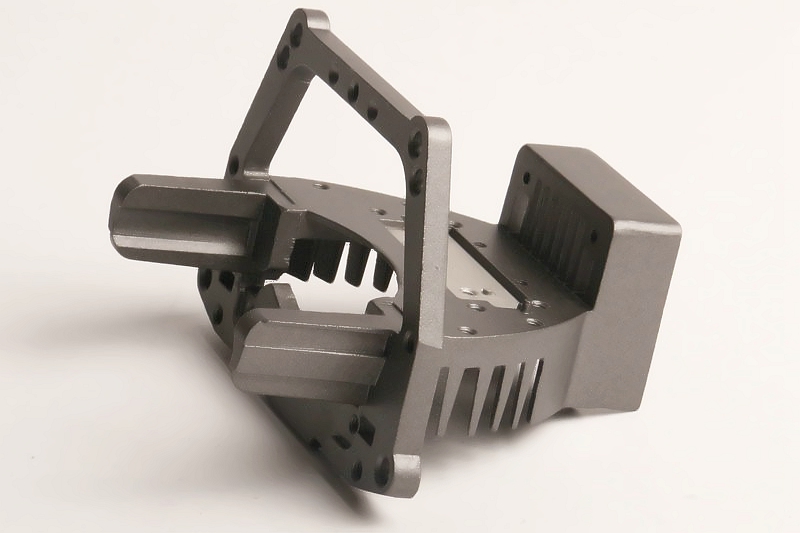
Sand Casting Material Options
Neway's sand casting expertise encompasses a wide array of material options tailored to meet the diverse needs of our clients. Specializing in aluminum alloys like A356, A380, and ADC12, our sand castings offer a winning combination of lightweight construction and exceptional corrosion resistance, making them ideal for applications in the automotive and aerospace sectors. Additionally, we excel in iron alloys, providing robust solutions with gray iron and ductile iron for components demanding higher strength and wear resistance. Our material repertoire extends to non-ferrous metals, including bronze, brass, and steel alloys, ensuring that our sand casting services cover a broad spectrum of industrial requirements.
At Neway, we take pride in our ability to offer a one-stop service for custom parts, facilitating a seamless transition from rapid prototyping to on-demand production. Our commitment to precision and efficiency is evident in our sand casting process, where tight tolerance control is a hallmark of our quality assurance. With a precision level of ±0.05 mm, we ensure that each sand-cast auto part meets the exact specifications required for optimal functionality. This precision is crucial in the automotive industry, where slight deviations can impact performance.
Furthermore, Neway's sand casting capabilities go beyond mere precision, incorporating advanced technology to enhance efficiency. Our automated systems and streamlined processes result in a high production rate, with an average output of 500 units per day. This efficiency meets and often exceeds industry standards, demonstrating Neway's commitment to delivering timely and cost-effective solutions to our clients.
Typical Sand Cast Auto Parts
Sand casting is particularly well-suited for manufacturing geometrically complex automotive parts, large-size auto components, and low-volume auto parts. This versatile method offers several advantages for these specific applications.
Geometrically Complex Automotive Parts:
Mold Flexibility: Sand casting utilizes a mold made of compacted sand, allowing for intricate shapes and fine details. This flexibility is crucial for components with complex geometries, such as engine cylinder heads or intricate transmission components.
Precision Reproduction: The sand mold can faithfully reproduce intricate patterns and designs, ensuring that the final cast part retains the intended specifications with high precision.
Cost-Effectiveness: Despite the complexity, sand casting remains a cost-effective option, aligning with Neway's commitment to providing efficient manufacturing solutions.
Example Auto Parts: Elaborate engine cylinder heads with intricate cooling passages and transmission housings with complex internal structures.
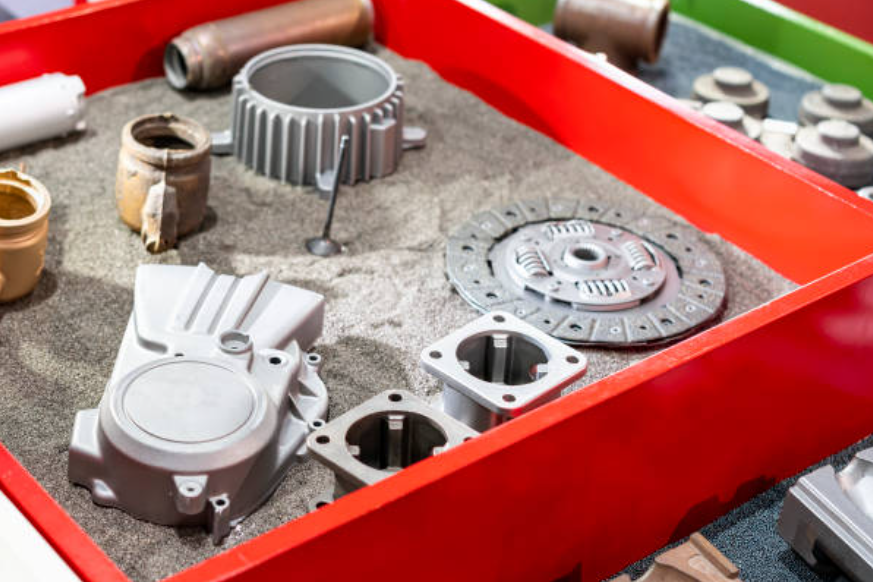
Large-Size Auto Parts:
Economical for Size: Sand casting's cost efficiency is particularly advantageous for large parts, as mold-making doesn't involve expensive tooling.
Scalability: The method can be easily scaled up to accommodate the production of substantial components like engine blocks or chassis parts without incurring prohibitive expenses.
Material Options: Sand casting supports a variety of materials suitable for large auto parts, including various alloys and metals, ensuring compatibility with diverse manufacturing requirements.
Example Auto Parts: Heavy-duty vehicle engine blocks, chassis components for trucks, large exhaust manifolds.
Low-Volume Auto Parts Manufacturing:
Reduced Setup Costs: Sand casting eliminates the need for intricate and expensive molds, making it a cost-effective solution for low-volume production runs.
Quick Turnaround: The simplicity of the sand casting process allows for rapid mold creation and casting, facilitating shorter lead times for limited production runs.
Customization Possibilities: Neway can quickly adapt the sand casting process to meet the specific requirements of low-volume, customized auto parts, aligning with their one-stop service for custom components.
Example Auto Parts: Niche or specialized auto components, limited vintage car parts production runs.
